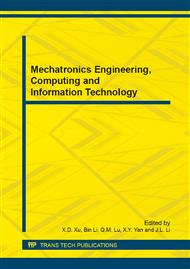[1]
R. I. Morimoto: Cells in stress: transcriptional activation of heat shock genes, Science Vol. 259 (1993), p.1409.
DOI: 10.1126/science.8451637
Google Scholar
[2]
D. R. Ciocca and S. K. Calderwood: Heat shock proteins in cancers: diagnostic, prognostic, predictive, and treatment implications, Cell Stress Chaperones Vol. 10 (2005), p.86.
DOI: 10.1379/csc-99r.1
Google Scholar
[3]
T. Lebret, R.W. Watson, V. Molinie, A. O'neill, C. Gabriel, J.M. Fitzpatrick, and H. Botto: Heat shock proteins HSP27, HSP60, HSP70, and HSP90: expression in bladder carcinoma, Cancer Vol. 98(2003), p.970.
DOI: 10.1002/cncr.11594
Google Scholar
[4]
M.A. Villaseca, I. Roa, J.C. Araya, J.C. Roa, and P. Flores: Double immunostaining for p.53 and molecular chaperone hsp72/73 in gastric carcinoma, Mol. Pathol. Vol. 50(1997), p.317.
DOI: 10.1136/mp.50.6.317
Google Scholar
[5]
W. C Dorsey, and P.B. Tchounwou: CYP1a1, HSP70, P53, and c-fos expression in human liver carcinoma cells (HepG2) exposed to pentachlorophenol, Biomed. Sci. Instrum. Vol. 39(2003), p.389.
Google Scholar
[6]
M.A. Bausero, D.T. Page, E. Osinaga, and A. Asea: Surface expression of Hsp25 and Hsp72 differentially regulates tumor growth and metastasis, Tumour Biol. Vol. 25(2004), p.243.
DOI: 10.1159/000081387
Google Scholar
[7]
V.L. Gabai, K.R. Budagova, and M.Y. Sherman: Increased expression of the major heat shock protein Hsp72 in human prostate carcinoma cells is dispensable for their viability but confers resistance to a variety of anticancer agents, Oncogene Vol. 24(2005).
DOI: 10.1038/sj.onc.1208495
Google Scholar
[8]
Q. Wang, L. An, Y. Chen, and S. Yue: Expression of endoplasmic reticulum molecular chaperon GRP96 in human lung cancer tissues and its clinical significance, Chin. Med. J. Vol. 115(2002), p.1615.
Google Scholar
[9]
X.P. Wang, Q.X. Wang, and X.P. Ying: Correlation between clinicopathology and expression of heat shock protein 72 and glycoprotein 96 in human gastric adenocarcinoma, Tohoku J. Exp. Med. Vol. 212(2007), p.35.
DOI: 10.1620/tjem.212.35
Google Scholar
[10]
X.P. Wang, Q.X. Wang, L.S. Guo, X.P. Ying, and Y.H. Zhao: Immunolocalization of heat shock protein 72 and glycoprotein 96 in human colonic adenocarcinoma, Acta Histochem. Vol. 110(2008), p.117.
DOI: 10.1016/j.acthis.2007.10.013
Google Scholar
[11]
Y. Maehara, E. Oki, T. Abe, E. Tokunaga, K. Shibahara, Y. Kakeji, and K. Sugimachi: Overexpression of the heat shock protein HSP70 family and p.53 protein and prognosis for patients with gastric cancer, Oncology Vol. 58(2000), p.144.
DOI: 10.1159/000012091
Google Scholar
[12]
K. Kato, K. Yamanaka, M. Nakano, A. Hasegawa, and S. Okada: 72-kDa stress protein (hsp72) induced by administration of dimethylarsinic acid to mice accumulates in alveolar flat cells of lung, a target organ for arsenic carcinogenesis, Biol. Pharm. Bull. Vol. 23(2000).
DOI: 10.1248/bpb.23.1212
Google Scholar
[13]
D.L. Fisher, E. Mandart, and M. Doree: Hsp90 is required for c-Mos activation and biphasic MAP kinase activation in Xenopus oocytes, EMBO J. Vol. 19(2000), p.1516.
DOI: 10.1093/emboj/19.7.1516
Google Scholar


